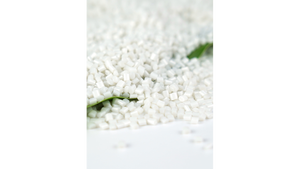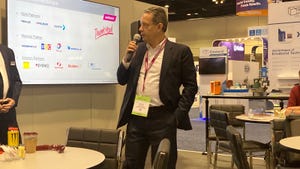Succeeding as a Contract Manufacturer
April 1, 1997
Change is nothing new at SPM/Houston. In fact, the SPM family of companies has undergone several changes during the past two years, including becoming a division of the Dynacast Co., a worldwide manufacturing subsidiary that is part of the CoatsViyella global conglomerate. So the decision to open its Houston molding operation in 1994 wasn't difficult. The deciding factor in selecting that site was the company's ties as a supplier to Compaq Computer Corp.
Its relationship with the computer giant has been strengthened by SPM/Houston's willingness to be more than a molder by providing comprehensive manufacturing solutions to its clients at competitive pricing. That business philosophy resulted in SPM/Houston being awarded a contract to build Compaq's Presario 3020 personal computer - beating out even Asian competition - and becoming the first injection molded components supplier worldwide to receive such a contract from Compaq.
The contract represents the largest program ever undertaken by SPM or Dynacast. SPM/Houston molds the more than 15 plastic components that make up the Presario 3020 PC. However, the plastic makes up only 8 to 10 percent of the unit's wholesale selling price to Compaq. Today, SPM/Houston has a new attitude and way of doing business that raised the company from the ranks of "just a molder" to that of a contract manufacturer.
Considering that molding is just a small part of this plant's activities, let's take a look at some of the manufacturing challenges. Then we'll learn what's behind this decision strategically.
Plant Layout
One critical factor in being a contract manufacturer is plant layout. Press placement in relation to production requirements increases overall production efficiency. In one case, as the requirement for one part ramped up to the point that two molds were required, a conveyor was placed between the two presses molding the part. Robots remove the parts in sequence, placing them on the conveyor where one operator can handle the flow of production from both presses. "It's all part of being creative in how to do things to make the total operation more efficient and costeffective," says Gary Ahlschlager, Compaq account manager for SPM/Houston. "When you're a contract manufacturer, production becomes more than just molding parts and putting them in a box."Plant general manager Ken Jones says that what you see at SPM/Houston today is typical of a molder of the 21st century. "Compaq predicted in 1988 and 1989 that the vendor of the future would be what we represent to OEMs as a supplier," says Jones. "Its vision has become a reality at this facility." Today, SPM/Houston operates 19 injection molding presses, including two new presses from Van Dorn, with clamping forces ranging from 15 tons to 720 tons.
Plantwide organization is also important. "Being a contract manufacturer, as opposed to being just a custom molder, means you're buying more than just gaylords of resin," says Ross Whitman, purchasing manager for SPM/Houston. Prior to the start of production of the Presario project in August 1996, the company worked closely with Compaq to establish inventory control procedures and implement a barcode system to address traceability issues for the more than 50 component parts from more than 20 vendors worldwide that go into each Presario unit.
Because many of Compaq's electronic components suppliers are located in other parts of the world, lead times became a crucial issue and a logistical challenge for SPM/Houston, which is responsible for purchasing all the components required to build the computer. That's where a good material requirements planning system comes into play. Too many high-dollar parts in inventory strap SPM/Houston's cash flow, and too few components mean computers don't ship on time. It's a delicate balance that the company has learned to aptly juggle through innovative new management systems and procedures.
Several assembly operations such as decorating and some subassembly work take place at the press. Subassembly work involves such operations as hot stamping, pad printing and sonic welding, and parts or subassemblies move from the press where that particular operation takes place to the assembly line where build-out of the units takes place. The subassembly is performed by an operator who is cross-trained in the main assembly functions. Those subassemblies are then sent to the line for final assembly and test. Most of the assembly is done by hand using small, electric hand tools, which means that managing the flow of work and the people who do that work is also crucial to an efficient manufacturing operation. Compaq engineers assisted SPM/Houston with the design and layout of the assembly line, including the fixtures that hold the parts in place while workers assemble the various pieces.
SPM/Houston is also responsible for the quality of the completed computers, which meant designing testing methods. For example, Mark Cox, SPM/Houston's quality assurance manager, collaborated with Compaq's vendor for power supplies in developing a test fixture that tests each power supply to 100 percent burn-in prior to going to the line for assembly. At the end of the assembly line, each built-out computer undergoes a 19-step, computerized testing process to ensure that all of the computer's components work properly.
On the Road to Contract Manufacturing
Becoming a contract manufacturer isn't easy. It requires a strong financial base to shoulder the costs involved in ramping up an assembly line, expanding internal functions, and implementing new management procedures, particularly in the areas of purchasing and inventory control. Fortunately, through its parent companies, SPM/Houston has that financial base. SPM currently has operations in the United States, Canada, Mexico, and a new facility in Wales that opened in January. The company continues to seek new opportunities for opening new facilities in other parts of the world as customer demand dictates.
"The level of commitment by the molder who takes on the entire project is much higher because he has no one to blame," says Ken Pulliam, project/production manager, adding that, because all the pieces to the puzzle are in one house, all the problem solving is done in one place, eliminating finger pointing by the various suppliers if something goes wrong.
By the same token, adds Whitman, "a true partnership means that if something does go wrong at the contract manufacturer's, the OEM takes some of the responsibility."
Fred Smith, regional manager of business development adds that the partnership formed between SPM/Houston and Compaq over the past several years is not typical of the industry, primarily because generally there's still a lot of mistrust when it comes to revealing financials and manufacturing cost structures. "It's actually a process of bringing the two companies together in such a way that the OEM's cost expectations are compatible with the contract manufacturer's profit expectations," he says. "It's a give and take project."
Once a partnership like that between SPM/Houston and Compaq is formed, the entire culture of the molder begins to change. "We're looking at ourselves as a global organization with the evolution of our business," says Smith. "We begin to see everything from a global perspective. When you start to develop that in your corporate culture, you get a different mind set; one that says you can be competitive with anyone."
Being a contract manufacturer also changes the perspective of the OEM community on what the role of the custom molder is in the overall production scheme. Jones adds: "OEMs have a certain mind set about what a molder is, and it's up to us to show them it's different."Additionally, Compaq introduced SPM/Houston to each of its suppliers and arranged meetings with each of its commodity managers to make sure that all the parties involved in the project stay on the same page throughout the life of the program. Cox qualified the vendors that would be supplying Compaq's components to SPM/Houston.
U.S. suppliers may have higher labor costs than suppliers overseas, which might be seen as a competitive disadvantage. However, SPM/Houston's management believes the company is proof that it can be overcome. "Labor may be cheaper in some foreign countries, but we still have the edge in technology in the United States," says Ahlschlager. "Instead of throwing labor at a challenging program, we figure out how we can utilize technology to increase our production efficiencies."
Now that SPM/Houston has successfully completed its entry into contract manufacturing, the company plans to offer its expertise to other companies requiring the same level of full-service production and assembly. Although molding remains an integral part of its manufacturing operations, molding plastic components has become a support function of SPM/Houston's assembly business rather than its primary business. Now that the assembly operation has ramped up to full speed, SPM/Houston plans to do similar work for other companies in the computer, business equipment, and telecommunications industries. It has already begun a similar program for Dell Computer Corp. on one of Dell's towers, and plans more for the future.
According to Tim W. Hayter, regional general manager for SPM/Dynacast, OEMs will continue to demand that their top suppliers go global with them. "I'm seeing a tremendous shift with OEMs as they get on this global march; they want their suppliers to go with them. Our job is to position ourselves to be able to respond to this. We know we can't be all things to all people, so we've chosen to transition from being a general supplier to becoming a strategic supplier in response to OEMs."
The possibilities that await molders who choose to move into the arena of being a contract manufacturer are endless, and it's the way the industry is moving. "Downsizing and heavy outsourcing by major OEMs plays right into the hands of molders if they learn to take advantage of it," says Smith.
SPM/HOUSTON, A dynacast Co., Houston, TX | |
|---|---|
Square footage: | 65,000 |
Markets served: | Computer, business equipment, and telecommunications |
Annual resin usage: | 1.5 million lb |
Materials processed: | PC, ABS, PVC, ABS/PC |
No. of employees: | 250 total; 60 percent permanent; 40 percent temporary |
Shifts worked: | Four shifts, seven days a week |
Molding machines: | 19 machines, 15 to 720 tons, Toshiba, Van Dorn, Boy |
Secondary operations | Decorating, hot stamping, sonic welding, pad printing, assembly |
Internal moldmaking: | Not at present, but planned |
Quality: | ISO 9002 in process |
You May Also Like


